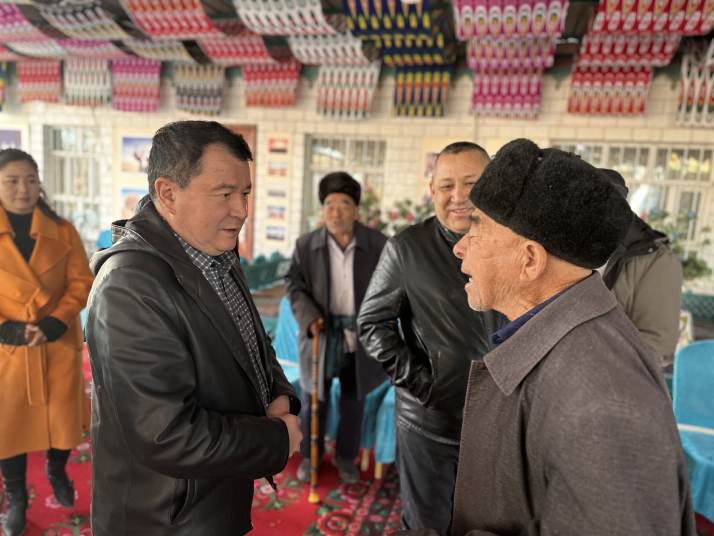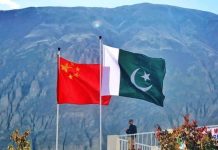
As dawn breaks over the ancient Silk Road lands of China’s Xinjiang Uygur Autonomous Region, Dilixiati Parhati is gearing up for yet another busy day. He juggles multiple roles: musician, scholar, leader of a Muqam art troupe and, most recently, a voice in China’s National People’s Congress (NPC)—the country’s top legislature.
In all these roles, safeguarding the soul-stirring music of Uygur Muqam, often dubbed “the mother of Uygur music,” for future generations is his mission.
Life is a dance
A day in Dilixiati’s life brims with music, creativity and the relentless pursuit of excellence. Inside the conference room of the Muqam Art Troupe of Xinjiang Art Theater, he engages in lively discussions with the troupe’s creative core about the upcoming staging of Muqam performances. As the afternoon unfolds, he reviews newly choreographed works with the directors, meticulously examining every detail for possible challenges and innovative opportunities. Late into the night, he fine-tunes the suggestions put forth earlier in the day.
Muqam is a multifaceted performance art, blending elements of song, dance and music. It covers an array of cultural expressions, from ancient philosophical insights to enchanting folk tales, creating a rich tapestry of Uygur life and society. This traditional art form, with a history spanning centuries, has evolved significantly over time.
Originally, the Uygur Muqam tradition was transmitted orally, passed down from generation to generation through performances. Cultural interactions and exchanges have long allowed the art to evolve and grow in diversity, a fact that never fails to light up Dilixiati’s eyes.
“So how do we safeguard its legacy in the 21st century, how can we ensure its continued relevance and how do we keep its vibrancy intact? Finding the answers to these questions are perhaps our most crucial tasks as inheritors of the art form,” he shared in an interview with Beijing Review.
Since being elected as an NPC deputy in 2023, Dilixiati’s responsibilities have multiplied. He’s now expected to venture beyond the confines of professional rehearsal halls and actively engage with folk artists. This entails absorbing their perspectives and injecting the art form he loves with greater authenticity and vitality.
NPC deputies come from all sectors of society, from politics to arts, and engage with different communities and stakeholders within their respective domains. As part of their role, they gather feedback and recommendations regarding the Central Government’s policies and actions, which are later brought to the attention of the NPC. These suggestions are then forwarded to the appropriate government departments for consideration and can influence legislative adjustments. Throughout this process, deputies also identify and address key issues within their specific fields, contributing to ongoing enhancements and developments in their areas of expertise.
Dilixiati often asks local folk artists how he can assist them in preserving the Muqam art form. “They don’t always articulate it clearly, but I do get what they’re trying to say: How can we ensure this beautiful art continues to resonate in people’s hearts?” Dilixiati shared.
Safe and sound
At present, the Uygur Muqam preservation system in China comprises four key areas: transmission through folk artists, educational initiatives, professional troupes and textual documentation.
The preservation efforts for the Xinjiang Twelve Muqam, a comprehensive repertoire of the genre originating from the city of Kashgar in south Xinjiang, began in the early 1950s.
A pivotal moment occurred when the local official came across Tuerdi Ahong, a talented local artist capable of performing 24 hours nonstop. Recognizing its cultural importance, the “discovery” was reported to the Central Government and piqued the interest of then Premier Zhou Enlai.
In 1951, then, a young Beijing-based musician called Wan Tongshu (1923-2023) was tasked with a mission to preserve the art of Muqam in Xinjiang.
Accompanied by his wife Lian Xiaomei and their 1-year-old daughter, Wan embarked on a train journey to the western region. That same year saw the official formation of the Xinjiang Twelve Muqam Organizing Task Group, with Wan appointed as its leader. In the years that followed, Wan worked closely with ethnic poets and artists to undertake and complete the recording, arrangement, notation and translation of all the lyrics for the Twelve Muqam, as performed by Tuerdi Ahong.
“The recordings were a crucial step. They marked an unprecedented feat,” Dilixiati recalled.
In 1954, with the introduction of better tape recorders, Wan invited Tuerdi to re-record the Twelve Muqam for improved sound quality preservation. The group worked with translators, Uygur poets and musicians to translate the lyrics into modern Uygur. Tuerdi’s rendition of the Twelve Muqam eventually comprised 340 songs and 2,990 lines of lyrics, according to Xinjiang Daily.
Two years later, Wan’s accomplishments in documenting the Twelve Muqam drew immediate attention in Beijing, leading to the government’s decision to publish the music scores and records. And as the decade’s curtain fell, Wan and a small team embarked on a journey to find more Muqam masters elsewhere in Xinjiang.
In 2005, the Xinjiang Uygur Muqam was listed among the Masterpieces of the Oral and Intangible Heritage of Humanity by UNESCO. It was inscribed on the UNESCO Representative List of Intangible Cultural Heritage in 2008.
Wan passed away last January, but his legacy lives on. His meticulous documentation of Tuerdi’s singing sequence set a precedent for the authentic structured performance of Muqam, Dilixiati noted.
As an NPC deputy, Dilixiati represents grassroots voices in legislative processes. To preserve and revitalize Muqam, he advocates for enhancing grassroots initiatives, offering specialized training for artists, and establishing dedicated spaces for cultural inheritance. Now, in the main regions where the Muqam art form is prevalent, there are heritage centers for artists to perform and study it. This also allows more ordinary people to feel the presence of this art in their lives.
Harmonizing horizons
Dilixiati believes that to truly preserve cultural heritage, traditional art must find its way into the hearts of modern audiences. For him, “a mission accomplished” is all about audience engagement and captivation.
The production Impressions of Muqam by the Muqam Art Troupe of the Xinjiang Art Theater, first staged in 2015, has continually evolved since making its debut. Its most recent renditions, taking to the stage in late 2022, exceeded expectations. Due to high ticket demand, the initial four scheduled performances were extended to 11 shows over the course of one month.
In recent years, Dilixiati and his team have taken their art beyond Xinjiang, performing in Shanghai, Beijing and internationally, to introduce it to a wider audience.
In a momentous visit to the Shanghai Conservatory of Music in early 2023, Dilixiati’s troupe impressed attendees with a riveting performance and offered quintessential insights on the Muqam art.
Last summer, then, a team of 36 performers from his troupe staged 11 successful performances in Indonesia, expanding their international reach.
Currently, Dilixiati is planning the production of a full-fledged Muqam opera, aiming to blend the ancient art form with modern international influences.
Dilixiati quoted Ji Xianlin (1911-2009), a globally respected Chinese Indologist, linguist and historian, who once highlighted Xinjiang as the only place where the world’s four great civilizations can be seen simultaneously.
Dilixiati strongly agreed with this view, adding, “And for me, Muqam perfectly embodies the convergence of these diverse civilizations.” –The Daily Mail-Beijing Review news exchange item





